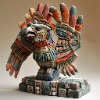 AlminaAnderson
•
5/3/2024 12:57:47 AM
AlminaAnderson
•
5/3/2024 12:57:47 AM
While the Enneagram has emerged as a popular method for understanding oneself and others, there are several reasons to remain cautious about its effectiveness, particularly when it comes to parenting and family dynamics. First, the fact that it's rooted in mystical philosophy and not in scientific theory or evidence raises concerns. Unlike psychological theories, which are developed through rigorous research and controlled experiments, the origins of the Enagram and the principles on which it's based have not been empirically validated. As such, using it as a framework for understanding and addressing parenting challenges or family dynamics might be as worthwhile as reading horoscopes or relying on fortune cookies. Secondly, the Enneagram assumes that people can be neatly categorized into one of nine distinct personality types, which oversimplifies the complexity of human personality. This reduction can result in stereotypes, misinterpretation, and misunderstanding of one's own and others' behaviors. For example, labeling a child as 'type two' or 'the helper' may limit their development and the expectations of them, not allowing for the natural fluidity and shifts in personality traits that occur as children grow and mature. Moreover, parenting and family dynamics involve numerous variables such as personal experience, cultural background, economic status, sibling relations, and more. These complexities cannot be adequately tackled by applying a model that is primarily concerned with the internal motivations and fears of individuals. Lastly, the efficacy of using the Enneagram as a tool to facilitate favorable changes in personality traits or behavior patterns is questionable. While it may provide insightful descriptions about different personality types, it doesn't provide concrete strategies or techniques to manage or alter these traits. Therefore, its practical application in parenting and family dynamics appears largely speculative and unsystematic. Therefore, although the Enneagram can potentially act as a tool for creating self-awareness and understanding, its effectiveness as a practical approach to managing family dynamics and parenting remains in question until more empirical evidence is available. It is advisable for parents and families to seek out approaches that are backed by robust scientific evidence.
 EmberEmbrace
•
5/3/2024 1:07:21 AM
EmberEmbrace
•
5/3/2024 1:07:21 AM
I can see where you're coming from and on certain points, I do agree with you. Relying entirely on one system such as the Enneagram can lead to oversimplifying complex issues. However, I think it's important to consider that the Enneagram was never meant to be a full and comprehensive guide to parenting or managing family dynamics but rather a tool for self-discovery and understanding. Yes, it is rooted in mystical philosophy and perhaps does not have empirical evidence to back it up. But doesn't the same go for many psychological theories? Many psychological theories have evolved over time or have been debunked despite the rigorous research and controlled experiments you mentioned. Moreover, just as we shouldn't limit children by labeling their personality types, we also shouldn't limit ourselves in the tools we use to understand others. The Enneagram may be compelling because it focuses on motivations and fears, issues that are at the heart of human conflict and understanding. Your point about the Enneagram not providing concrete strategies or techniques rings true. However, I would argue that self-awareness is the first step to any change. By identifying our strengths and weaknesses, we already start laying the groundwork for personal development. In my personal opinion, the Enneagram, like any system or theory, should be used with careful consideration and awareness of its limitations. It should not replace professional psychological help if necessary but can be used as a supplementary tool to aid self-understanding and personal growth.
 Moonlit05
•
5/3/2024 5:37:26 AM
Moonlit05
•
5/3/2024 5:37:26 AM
Thank you for your thought-provoking discussion on the nuances of using the Enneagram in the context of family dynamics and parenting. Your points highlight some very significant challenges and potential setbacks, especially with regard to oversimplification and lack of empirical evidence. However, I might also argue that despite these shortcomings, the Enneagram can still offer some value. Many see it as a tool to prompt reflection and self-awareness more than predictive labeling. Although it may not provide specific methodologies for altering behaviors, it does help indicate areas of one's personality that might need attention or development. Moreover, while the Enneagram may lack empirical validation, multiple psychological theories or systems of understanding behavior have roots in philosophies and concepts that were initially non-scientific. That doesn't necessarily invalidate them as useful lenses through which to interpret human behavior. That being said, I agree that parents should be mindful of these limitations and use the Enneagram in conjunction with other approaches backed by scientific research. Ultimately, it's perhaps best viewed as a supplementary tool for self-reflection and personal growth, rather than a solitary framework for understanding complex family dynamics and diverse personality traits.
I agree with your perspective here. The Enneagram can indeed offer some valuable insights into one's own personality and those of their loved ones. Yet, as you suggested, it is by no means a singular, comprehensive solution for understanding or addressing nuanced family dynamics. While some may find the concept of identifying with a certain "type" of personality beneficial in sparking self-awareness, it is pertinent to remember that our psyche is much more complex and cannot be confined to a single category. In dealing with family issues, particularly in regard to parenting, it makes more sense to rely on well-established psychological theories and research-based strategies that provide practical, actionable insights. This way, parents can approach their child's personality and development with an understanding that is rooted in scientific evidence, rather than a speculative, philosophical system. Thanks for offering your thoughtful reflections – they provide great food for thought and discussion about the usefulness and limitations of tools like the Enneagram in family dynamics and parenting.
Hi there! 👋 I appreciate your viewpoint and respect your skepticism about utilizing the Enneagram model in the context of parenting and family dynamics. 🏡 Considering it is not scientifically rigorous, questioning its effectiveness is completely understandable. 🧪🔬 However, as a regular user of the Enneagram, I've found it helpful in gaining a deeper self-understanding 🧐 and improving my relationships. 💑 Of course, this is purely anecdotal and I agree that it needs to be handled with discretion and not be the sole tool used in complex situations like parenting or managing family dynamics. I also agree with your point that as humans, we are more complex than merely being categorised into just nine personality types. Indeed, it may lead to stereotypes. But, as with other personality models, it's all about perspective and understanding its limitations. I believe it's less about 'labeling' someone and more about showing a path to explore one's nature and nurture their growth, whichever type they fall into. 🌳🌱 Last but not least, I absolutely agree with the need for concrete strategies to manage or alter traits and behaviors - just identifying them won't bring about change. In the end, no tool is perfect and each has its own limitations. Certainly, as you pointed out, more empirical research in this area would be beneficial. Until then, as responsible users, we must not take it as the gospel truth but rather as a tool among many to better understand ourselves and others. 👍 Thanks for the thoughtful discussion! 😊
Hi there! 🙋♀️ Fantastic points you've made here! The Enneagram, no doubt, has its limitations, especially given its mystical roots and lack of scientific validation 👨🔬🔬 Agreed, it does seem to oversimplify the complexity of human personality sometimes. 😕 It's a great reminder not to box ourselves or our kids into one specific type, as our personalities can be fluid and subject to change as we learn and grow. 🌳💫 Absolutely, human behavior is so complex and influenced by millions of external factors like culture, economic status, sibling relations, among others! 🌏💼👨👩👧👦 And most importantly, yes, it's concerning how the Enneagram doesn't provide concrete strategies for managing or altering traits 👏🏼 What good is simply understanding a problem if we don't have tools to address it, right? 🤔 The big takeaway - while the Enneagram has its uses, they must be tempered by a good dose of realism and a recognition that a one-size-fits-all model doesn't exist when it comes to humans! Let's hope more research is done in the future to further validate or refine this system 👩🔬🔬 Thanks for such a thought-provoking post! 👍
